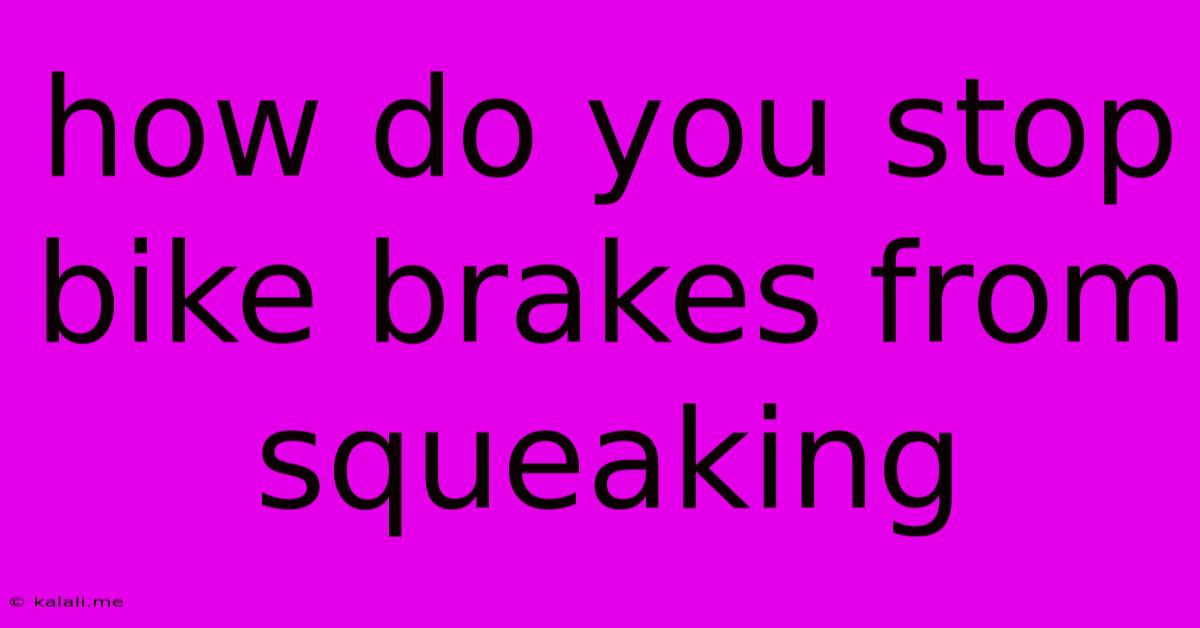How Do You Stop Bike Brakes From Squeaking
Kalali
May 21, 2025 · 3 min read

Table of Contents
How to Stop Bike Brakes from Squeaking: A Comprehensive Guide
Bike brakes squeaking? That annoying screech can ruin a peaceful ride and even signal a potential safety issue. This guide will walk you through the common causes of brake squeak and provide effective solutions, helping you enjoy silent, smooth rides again. We'll cover everything from simple cleaning techniques to more involved adjustments.
Understanding Why Bike Brakes Squeak
Before diving into solutions, let's understand why your brakes squeak. The most common culprits are:
- Dirty brake pads: Brake pads accumulate dirt, grime, oil, and brake dust over time. This buildup creates friction and leads to that dreaded squeak.
- Worn brake pads: Thinned-out brake pads can vibrate against the rim or rotor, causing noise. This is also a safety concern, as worn pads reduce braking power.
- Misaligned brakes: If your brakes aren't properly aligned, they might rub unevenly against the rim or rotor, resulting in squeaking.
- Wet or oily brake surfaces: Water or oil on the brake pads or rims/rotors can significantly increase friction and lead to squeaking.
- Brake pad material: Some brake pad materials are simply more prone to squeaking than others.
Effective Solutions to Silence Squeaking Brakes
Now that we know the likely causes, let's tackle the solutions. These steps should be attempted in order, starting with the simplest and progressing to more involved methods.
1. Cleaning Your Brakes:
This is often the easiest and most effective fix. Here's how:
- Gather your supplies: You'll need a clean cloth, isopropyl alcohol (rubbing alcohol), and possibly a stiff brush (an old toothbrush works well).
- Clean the brake pads: Carefully wipe down the brake pads with the cloth dampened with isopropyl alcohol. Remove any built-up debris, grit, or oil.
- Clean the rims or rotors: Thoroughly clean the braking surface (rim or rotor) with the alcohol and cloth. Pay special attention to any areas where the brake pads make contact.
- Dry everything thoroughly: Allow the brake pads and rims/rotors to air dry completely before reassembling.
2. Checking and Replacing Brake Pads:
Inspect your brake pads for wear. If they are significantly worn down (below the wear indicator line, if present), they need replacing. New pads are typically quieter and provide better braking performance. Ensure you select the correct pads for your brake type (rim brakes or disc brakes).
3. Adjusting Brake Alignment:
If cleaning and replacing pads don't solve the problem, your brakes might be misaligned. This often requires some mechanical skill. Depending on your brake type, you may need to adjust the cable tension (for rim brakes) or caliper position (for disc brakes). Refer to your bike's manual or consult a bike mechanic for precise instructions.
4. Addressing Wet or Oily Conditions:
If you've ridden in wet or muddy conditions, thoroughly clean your brakes as described above. If oil contamination is suspected, a more intensive cleaning might be necessary, possibly involving degreaser. Always ensure the braking surfaces are completely dry before riding.
5. Brake Pad Material Consideration:
If the problem persists despite all the previous steps, consider the type of brake pads you’re using. Some materials are inherently noisier than others. Research alternative brake pad compounds known for reduced noise.
Preventing Future Squeaks:
- Regular Cleaning: Clean your brakes regularly, especially after riding in wet or dirty conditions.
- Proper Maintenance: Keep your brake pads and rims/rotors in good condition to minimize friction.
- Careful Riding: Avoid harsh braking whenever possible.
By following these steps, you should be well on your way to eliminating those annoying squeaks and enjoying smoother, quieter rides. Remember, if you're unsure about any of these steps, it's always best to consult a professional bike mechanic. They can diagnose the problem accurately and perform the necessary repairs.
Latest Posts
Latest Posts
-
How To Get Tarmac Off Clothes
May 22, 2025
-
Can A Jew Marry A Non Jew
May 22, 2025
-
How To Go Into 3rd Person In Minecraft
May 22, 2025
-
How To Stop Filler Showing Through Paint
May 22, 2025
-
How Many Teabags For A Teapot
May 22, 2025
Related Post
Thank you for visiting our website which covers about How Do You Stop Bike Brakes From Squeaking . We hope the information provided has been useful to you. Feel free to contact us if you have any questions or need further assistance. See you next time and don't miss to bookmark.